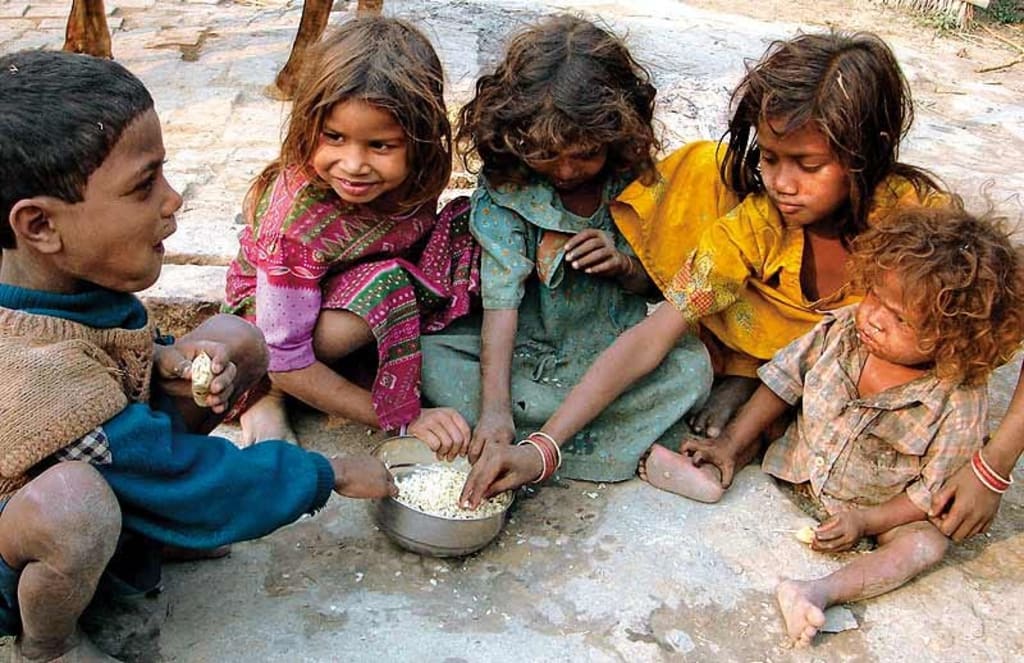The Underestimated Power of Poverty in Preparation Contrary to Riches
Underestimated Power of Poverty

In a world that often equates success with material wealth, the power of poverty in preparing individuals for life's challenges is frequently overlooked. Contrary to popular belief, poverty has its own unique way of shaping character, fostering resilience, and preparing individuals for the complexities of life. In this exploration, we delve into the underestimated power of poverty in preparation, contrasting it with the traditional notion of riches as a pathway to success.
The Forge of Resilience
One of the most remarkable aspects of poverty is its ability to forge resilience in individuals. When faced with limited resources and opportunities, individuals often develop an unparalleled capacity to overcome adversity. The daily struggles of making ends meet instill a resilience that is not easily shaken by life's inevitable setbacks. In contrast, those who have never experienced financial hardship may lack the resilience necessary to navigate challenges effectively.
In the crucible of life's trials, resilience is forged through hardship, failure, and perseverance. Each blow of difficulty tempers the spirit, imparting resilience like steel tempered by fire. Just as metal undergoes intense heat to become resilient, individuals face trials that refine their character and fortify their resolve.
Resilience isn't about avoiding adversity but about facing it head-on and emerging stronger. It's the ability to bend without breaking, to bounce back from setbacks, and to thrive despite challenges. The forge represents the transformative power of adversity, shaping individuals into more resilient beings capable of navigating life's tumultuous waters.
Moreover, the forge of resilience isn't a solitary journey but a communal one. It's the support of loved ones, the guidance of mentors, and the strength found in community that helps individuals endure and grow stronger.
Ultimately, "The Forge of Resilience" reminds us that adversity is not the end but the beginning of strength. It teaches us that through perseverance, courage, and a willingness to learn from our struggles, we can emerge from the forge stronger, wiser, and more resilient than ever before
Embracing Resourcefulness
Poverty necessitates resourcefulness as individuals learn to make the most of what they have. In environments where resources are scarce, creativity flourishes as individuals find innovative solutions to everyday problems. This innate resourcefulness not only enables individuals to survive but also equips them with valuable skills that are transferable to various aspects of life. In contrast, individuals accustomed to abundance may rely on material wealth rather than their ingenuity when faced with challenges.
One of the key benefits of embracing resourcefulness is its ability to foster self-reliance and independence. When individuals learn to rely on their ingenuity and resourcefulness, they become less dependent on external factors for their success or happiness. Instead of waiting for perfect conditions or abundant resources, they take initiative and create their own paths forward.
Moreover, resourcefulness breeds innovation. When faced with constraints, individuals are forced to think creatively and come up with unconventional solutions. This not only leads to new ideas and inventions but also fosters a culture of continuous improvement and problem-solving.
Furthermore, embracing resourcefulness cultivates a positive mindset and attitude towards challenges. Instead of viewing obstacles as insurmountable barriers, resourceful individuals see them as opportunities for growth and development. They embrace challenges as chances to learn, adapt, and evolve, ultimately becoming more resilient in the face of adversity.
Building Empathy and Compassion
Living in poverty often fosters empathy and compassion towards others who are struggling. When individuals experience firsthand the hardships of poverty, they develop a deeper understanding of the human condition and are more inclined to help those in need. This empathy and compassion are invaluable qualities that enable individuals to build meaningful connections and contribute positively to their communities. In contrast, the pursuit of riches can sometimes lead to a disconnect from the struggles of others, as individuals become more focused on personal gain.
One way to cultivate empathy and compassion is through education and exposure to diverse experiences and perspectives. By learning about different cultures, backgrounds, and life circumstances, individuals can develop a greater understanding of the challenges others face and the emotions they may be experiencing. This exposure can help break down stereotypes and prejudices, fostering empathy and compassion towards people who may be different from oneself.
Additionally, practicing active listening and perspective-taking can help strengthen empathy. By truly listening to others without judgment and trying to see things from their point of view, individuals can deepen their understanding of others' experiences and emotions. This not only builds empathy but also fosters stronger connections and relationships with others.
Furthermore, engaging in acts of kindness and service can cultivate compassion. By actively seeking out opportunities to help others and make a positive impact in their lives, individuals can develop a greater sense of empathy and compassion towards those in need. Whether it's volunteering at a local shelter, lending a listening ear to a friend in distress, or simply performing random acts of kindness, these actions can help foster a more compassionate society where everyone feels valued and supported.
Cultivating Grit and Determination
Poverty cultivates grit and determination in individuals as they strive to improve their circumstances against all odds. The relentless pursuit of a better life in the face of adversity requires a level of tenacity and perseverance that is unparalleled. Those who have experienced poverty firsthand often possess a drive and determination that propels them towards success, regardless of the obstacles they encounter. In contrast, individuals born into privilege may lack the same level of grit and determination, as they may not have faced the same level of adversity in their lives.
To cultivate grit and determination, one must first cultivate a growth mindset. This mindset embraces challenges as opportunities for learning and sees failures as stepping stones to success. It fosters resilience by teaching individuals to bounce back stronger from setbacks.
Moreover, setting clear and achievable goals is essential. Goals provide direction and purpose, motivating individuals to push through difficulties to reach their desired outcomes. Along the journey, it's crucial to maintain focus and stay disciplined, even when the path forward seems uncertain.
Support systems also play a vital role in cultivating grit and determination. Surrounding oneself with mentors, peers, and loved ones who offer encouragement and guidance can provide the necessary motivation to keep going when the going gets tough.
Ultimately, cultivating grit and determination is a lifelong journey that requires continuous effort and dedication. By embracing challenges, setting goals, maintaining focus, and seeking support, individuals can develop the resilience and perseverance needed to overcome any obstacle and achieve their dreams
Fostering Humility and Gratitude
Living in poverty fosters humility and gratitude as individuals learn to appreciate the simple joys of life. In a society that often glorifies material wealth, poverty offers a perspective shift, reminding individuals of the importance of gratitude for the things that truly matter: family, health, and community. This humility instilled by poverty allows individuals to approach life with a sense of gratitude and perspective that is often lacking in those who are accustomed to abundance.
Gratitude, on the other hand, serves as a beacon of positivity, illuminating even the darkest of moments with its radiant light. It encourages individuals to shift their focus from scarcity to abundance, from complaints to appreciation. By cultivating gratitude, one learns to find beauty in simplicity, joy in the ordinary, and meaning in every experience. Gratitude nurtures resilience, enabling individuals to navigate life's challenges with grace and optimism.
Together, humility and gratitude form a powerful synergy that fuels personal development and fosters a more harmonious society. They remind us of our interconnectedness and shared humanity, inspiring acts of kindness, compassion, and generosity. In a world often defined by competition and consumption, humility and gratitude offer a counterbalance, guiding us towards a path of fulfillment and authentic success. As we embrace these virtues, we not only enrich our own lives but also contribute to the collective well-being of humanity.
Conclusion
In conclusion, the underestimated power of poverty in preparation contrary to riches is a testament to the resilience, resourcefulness, empathy, grit, and humility it fosters in individuals. While poverty is often viewed as a barrier to success, it can also serve as a catalyst for personal growth and development. By embracing the strengths of poverty, we can cultivate a greater appreciation for the diverse paths to success and a deeper understanding of the human experience.
About the Creator
Paramjeet kaur
Hey people! I am my own person and I love blogging because I just love to share the small Stories






Comments
There are no comments for this story
Be the first to respond and start the conversation.